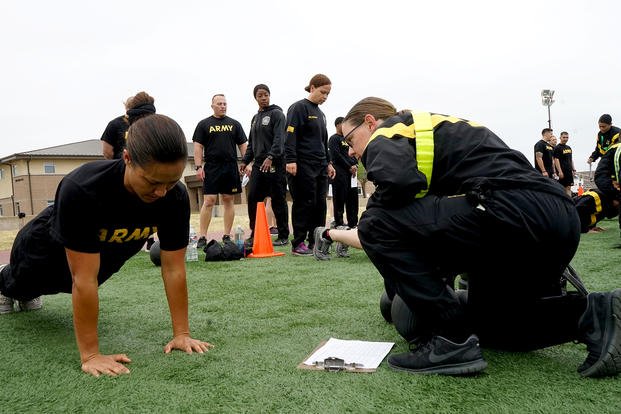How important are fitness tests? It depends. They can be a simple test that you do every six months to show that you are healthy enough to serve, but they also can be worth thousands of dollars in scholarships, job advancement and other career progressions.
Here is an email from a college-bound young man who is applying for an ROTC scholarship. Depending on the college, this scholarship can be worth more than $100,000 in four years, complete with education and military training. So yes, it can be a big deal and is that important. Here is his question:
Mr. Smith,
I have just started training for an ROTC fitness test set for one month from now. It involves one minute of push-ups, one minute of sit-ups and a one-mile run. I just started your push-up workout yesterday, and I wanted to ask if you had any suggestions or workouts I could do to better prepare myself for the workout. Thank you for your time, Will
My long-term recommendation is that training for this should have started months ago. Get on an actual program where you can progress logically over time and see a sustained pattern of growth, speed and endurance. No need to expand further but consider the PFT Bible next time.
My short-term recommendation is to get on an actual program, not just a bunch of daily push-ups, sit-ups and running. This unorganized method can lead to lack of performance, injury and typically is just a waste of time. If you are into making your own training programs, follow the rules:
Calisthenics every other day: Build up your volume for calisthenics and running throughout the week, each week. Do not do daily push-ups and sit-ups, especially if you are new to training. Yes, there are some daily programs that can be done for a short period of time and will yield good results. The push-up push and sit-up push will help significantly in two weeks, but after that, you need to go to every other day.
However, since you only have one minute to do these repetitions, you can push yourself faster in the first 30 seconds, versus pacing yourself for a full two-minute test. Set a pace, and try to maintain it for both push-ups and sit-ups, that help you reach optimal or competitive scores.
Once you get through the push-up and sit-up push, try this: 15-day PFT prep workout.
Running several days a week: If you are new to running, you may need to just focus on running every other day with a focus on faster pace. Since it is only a one-mile run, many beginning plans start out by just running one mile. You have to build up so you can run a full mile without stopping first, then focus on increasing your pace so you can get in the six- to seven-minute mile pace zone. If you really want to stand out, a sub-six-minute mile is recommended as you will be competing against many other high-performing individuals who may have a track background and can get a five-minute mile easily.
Running Plan I -- for beginning timed run
| Wk | Mon | Tues | Weds | Thurs | Fri or Sat |
| 1 | 1 mile | 4x 400m runs
at goal pace |
1.5 mile | 4x 400m runs
at goal pace |
1-2 mile |
| 2 | 1.5 miles | 6 x 400m runs
at goal pace |
2 miles | 6 x 400m runs
at goal pace |
2 miles |
| 3* | Bike or swim | Bike or swim | Bike or swim | Bike or swim | Bike or swim |
| 4 | 2 x 1 mile fast | 6 x 400m runs
at goal pace |
4 x 800m run at
goal pace |
6 x 400m runs
at goal pace |
Day off / Test
1 mile after max Pushup / Situps |
*If you are feeling sensitive (shins, knees, etc.), do not run week three and replace with non-impact cardio. Otherwise, repeat week two.
You still should be on a running program to work on your mile pace, and depending on your current running abilities, you at least should focus on running a mile a day. If that hurts, try running every other day as well with bike or swim workouts on the days in between to work your lungs without the impact of running.
Do not just jump into long, slow distance runs of four to five miles when you run for your workouts. Keep your runs short and fast, mixing in some quarter- and half-mile interval workouts (not sprints but goal pace). See Getting Faster with Goal Pace Running.
Good luck.
Stew Smith is a former Navy SEAL and fitness author certified as a Strength and Conditioning Specialist (CSCS) with the National Strength and Conditioning Association. Visit his Fitness eBook store if you’re looking to start a workout program to create a healthy lifestyle. Send your fitness questions to stew@stewsmith.com.
Want to Learn More About Military Life?
Whether you're thinking of joining the military, looking for fitness and basic training tips, or keeping up with military life and benefits, Military.com has you covered. Subscribe to Military.com to have military news, updates and resources delivered directly to your inbox.
















